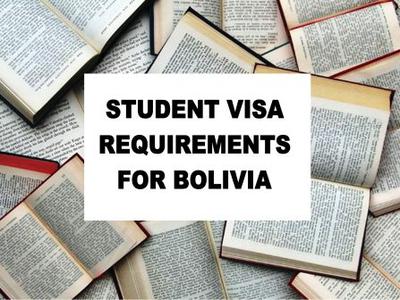|
How to Apply for a Bolivia Student Visa The Bolivia student visa is the option you will choose if you are planning to study as a foreign student at a Bolivian secondary school or university, for a period of one (1) to three (3) consecutive years.
(If you are planning to study in Bolivia for only one semester as an exchange student, there is an alternative 180-day exchange student visa for which you may qualify. If that is your plan, then this long-term student visa is not for you. Be sure to ask your local Bolivian consulate to inform you regarding that option). The Bolivia student visa is an entry visa only. Once you have entered Bolivia, the student will have up to sixty (60) days to complete his/her application for up to three (3) years of residency. Should the student not complete their studies in 3 years, he/she can apply to extend the residency for periods of up to three (3) more years until graduating. Bolivia Student Visa ApplicationBolivia has created 3 lists of countries with different rules for visas. Citizens of the countries listed in Group 1 do not need a tourist visa to enter Bolivia. Citizens of the countries listed in Group 2 do need a tourist visa, but do not have to obtain it prior to travel. It will be issued to you as you arrive, either as you are crossing over a border point or when you arrive at the airport. Citizens of the countries listed in Group 3 are required to obtain a tourist visa from a Bolivian consulate prior to traveling to Bolivia and must show it to officials upon arrival.
The Bolivian Immigration Authority (Dirección General de Migración) has published an excellent and very detailed booklet outlining exactly how to determine which is your country visa group, and which are the requirements for each group. It also highlights information on what your legal rights are as a foreign student in Bolivia, and lists the countries in each visa group for easy reference. Download What you need to know to study in Bolivia. The document is available in Spanish only at this time. You may wish to copy and paste relevant portions of text into www.translate.google.com to understand it in your language. Next, visit the Bolivian government's Immigration Website, and click on Translator at the top of the page. Find your language on the menu and click to see the page in your language. Although some of the requirements will differ among countries, generally, all students wishing to study for prolonged periods of time in Bolivia will be required to present to a Bolivian consulate in your country (or Immigration office in Bolivia) the following documents, minimally. However, according to your country's visa group, further documentation may be required of you.
Steps to Apply for the Student VisaFirstly, fill out a Sworn Statement for Visa Application. The statement can be obtained on the websites of the Migración (Immigration Authority), or the Bolivian consulate in the country in which you will request the visa. Once you've printed and filled out the sworn statement, gather the following as well (again, per your country's visa group, additional paperwork may be required): 1. Passport with a minimum of 6 months remaining on it before it expires. 2. Additionally, if you will be traveling to a tropical area in Bolivia, you should get a yellow fever vaccination. You can include a copy of the vaccination certificate with your visa application or take it with you to show to immigration officials upon arrival at the airport (most of them never ask to see it). 3. Any of the following documents that accredit your last year or level of study at a school, institute or university in the country in which you lived. These must be legalized by the corresponding office or consulate: - Certificate of studies 4. A current certificate that accredits that the foreigner has no prior criminal and/or police record, issued by the competent authorities in his or her country of origin or last residency (does not apply to minors under the age of 16). 5. Current photograph (4 x 4 centimeters with a red background). 6. Medical certificate stating that applicant does not suffer from contagious disease (must include an ELISA analysis for HIV.) 7. Copy of Itinerary or travel reservation. 8. If the applicant is a minor, according to Bolivian law, legal permission from parents or guardians, countersigned by competent authority to travel and stay in Bolivia. 9. Certification of financial standing of the applicant or parent, if applicant is a minor. 10. Corresponding letter of acceptance from a Bolivian university and/or educational institution. 11. Payment of the visa fee, the cost of which may vary depending on which country you are from. The Bolivian consulate in your country or region will inform you.
Presenting or Mailing your Visa Application*All documents issued by the country of origin, or in your country of most recent residency, in any language other than Spanish must be translated and duly legalized (signed by a notary public, then apostilled, then signed and stamped by the Bolivian consulate). All of these documents must be presented in person or mailed to the Bolivian consulate. If you process your specific purpose visa by mail, you must also download (from the consulate's website) a credit/debit card authorization form to pay for the visa. Print it, fill it out, and send it in. The safest way to send your passport is by registered mail or courier. If you process your visa by mail, the safest way to ensure your passport is not lost when they return it to you, is to include a self-addressed, postage pre-paid courier envelope (such as FEDEX or DHL) when you send your package to them. The consulate can then use it to return your passport to you with the visa sticker adhered onto one of its pages. Applications for the student visa that are incomplete or illegible will cause the consulate to return your package and passport to you, unprocessed, and you may forfeit the fee you paid. Again, before you apply for a Bolivia student visa, be sure you have determined that this is the correct visa for you. Read through the Bolivian government's booklet What you need to know to study in Bolivia again.     |

